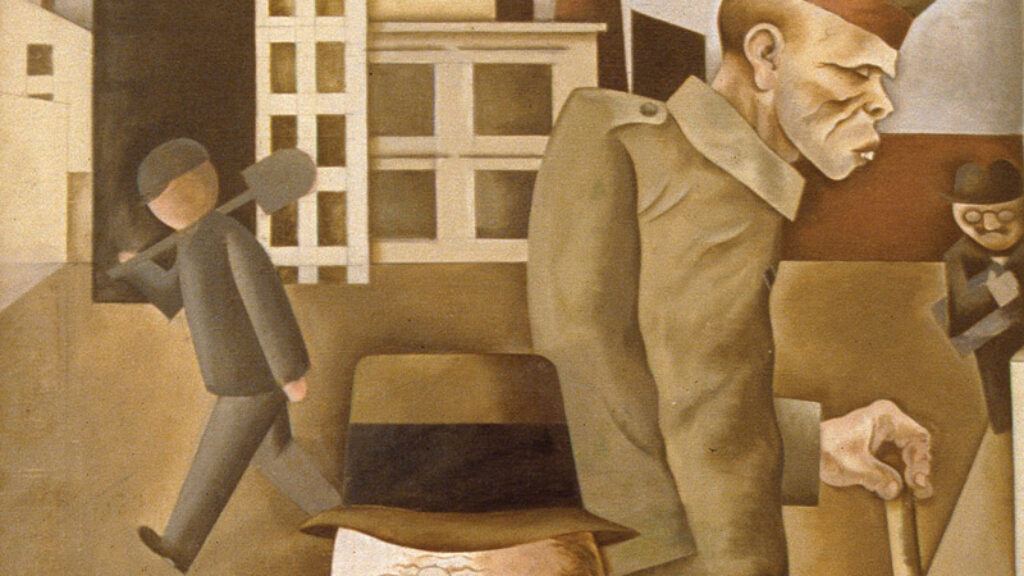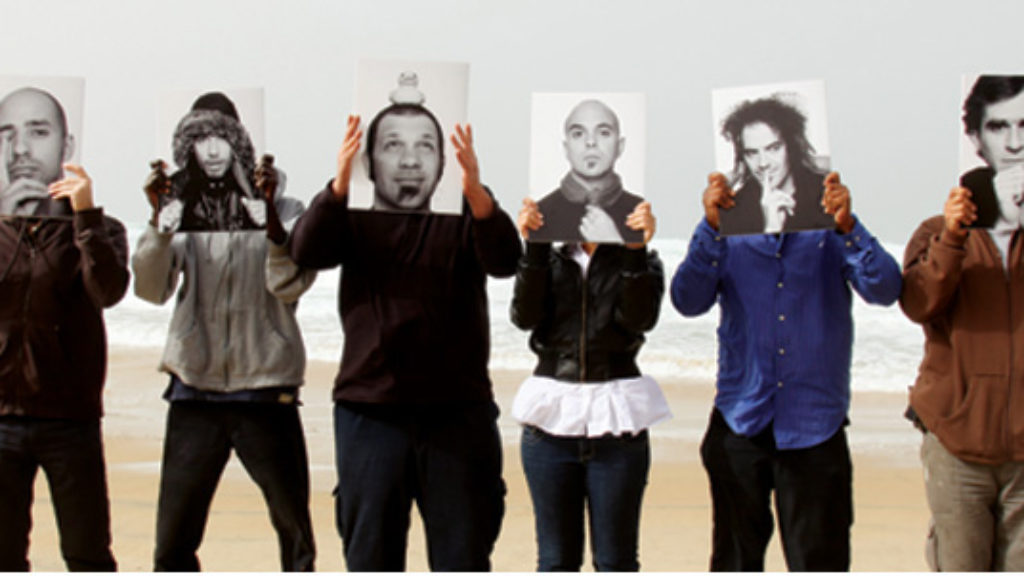Why the Long Face?
An amnesiac walks into a bar. He goes up to a beautiful blonde and says, “So, do I come here often?”
Two men walk into a bar. You’d think at least one of them would have ducked.
The past, present, and future walk into a bar. It was tense.
All of these jokes are variations on the old chestnut that is the unlikely title of David Grossman’s latest novel, A Horse Walks into a Bar, which was just awarded the Man Booker Prize. Readers are used to turning to Grossman for his explorations of the vast themes of memory and loss, which aren’t generally funny unless, of course, you count cosmic jokes. The book’s theatrical, saturated yellow cover flashes a “One Night Only” banner next to Grossman’s name, and we understand that this is a stand-up show that will span both an evening and an entire life. It is Grossman’s shortest book, an arresting, disturbing read with no obvious punch line but one long face.
That face belongs to comedian Dov Greenstein, who has decided that this show in a seedy Netanya club will be his very last performance. As he begins his routine, Dovaleh does what all comedians do. He plays off his audience, cajoling them, pacing about the stage, sweating, mocking them, leaning into them, then away. He ridicules Netanya and its residents constantly: “Of course I’ve had Netanya women! . . . Beggars can’t be choosers, times were hard, we had to make do.” The audience laps it up, slapping themselves, bursting with raucous laughter. Minutes later, he singles out table eight. He crouches to get closer: “What are you beauties celebrating tonight? Is one of you becoming a widow at this very second?” What had begun as typical stand-up becomes a strange, unnamable form of performance art. We soon find ourselves not only identifying with but actually becoming part of the audience. As the mood darkens, the question will be how long we stay, as Dovaleh taunts us:
You don’t just slam someone with “‘You’re in Netanya.’ Bam! What’s the matter with you? You gotta give a guy some warning, especially when he’s so skinny.” He lifts up his faded T-shirt and a gasp passes through the room. “Ain’t it so?” He turns his bare chest to the people sitting on either side of the stage and flashes a big grin. “See this? Skin and bones. Mostly cartilage. I swear to God, if I was a horse I’d be glue by now, you know what I’m saying?” Embarrassed giggles and repulsed exhalations in response. “All I’m saying, sister,” he turns back to the woman, “is next time, when you give someone this kind of news, you need to do it carefully. Anesthetize him first. Numb him up, for God’s sake.”
The physical exposure of Dovaleh’s cancer-ravaged body mirrors his emotional exposure. The thin man and the thin horse will not last long. The joke will not end. Numbing is required, the kind of numbing that comes from being on stage night after night in a pathetic grab for laughs. There is a looming assumption that if Dovaleh can extend the performance, he can extend his life. This is not unlike the ruse that Ora, the protagonist of Grossman’s To the End of the Land, creates when she goes on a long, extended hike to avoid the IDF coming to her door with terrible news. If she’s not there, it simply cannot happen. If Dovaleh continues to tell jokes, the Angel of Death cannot claim him.
Dovaleh has invited a childhood friend with whom he has lost touch to his show: Avishai Lazar, a recently retired Supreme Court justice. At first, Lazar doesn’t remember him. The comedian is hurt but presses on. He needs a favor. He will even pay him to come to the show. The judge, however, does not like stand-up. “Don’t take it personally, but it’s really not something I relate to. . . . All that kidding around, the jokes, the performing, it’s not for me, not at my age. I’m sorry.” Lazar even tells Dovaleh, “I’m not judging anyone,” but, of course, he is. To him, comedians are bottom feeders: “everything is just fodder for jokes … illness, death, war, it’s all fair game, hey?” But Dovaleh persists:
“I want you to look at me,” he spurted. “I want you to see me, really see me, and then afterward tell me.”
“Tell you what?”
“What you saw.”
This anti-comic judge is our narrator, and we watch Dovaleh’s unsettling show through his eyes, as the comic banter becomes increasingly harsh. Dovaleh gets lost in digressive childhood reveries. At one point on stage, he recreates a moment when his father was using a knife to cut dough into lokshenbrat and then tells the audience that his mother, a Holocaust survivor, was not allowed near knives. “The crowd is stone cold,” Lazar tells us. What kind of comedy is this? Finally, an audience member gets up and tugs at his wife to leave. Someone tries to stop them. “‘Enough is enough’ the guy hisses. ‘People come here to have a good time, it’s the weekend, you wanna clear your head, and this guy gives us Yom Kippur.’”
As the show incrementally turns into a one-man tragedy, Dovaleh reveals the comic’s dilemma: “The stress of having to make people laugh at any cost, and how we basically beg you to love us.” We love them for ridiculing us. With this, he publicly outs the judge. “…I would now like to welcome, with great excitement and deference, from the country’s highest seat of justice, Supreme Court judge Avishai Lazar, who came here this evening unannounced, in order to publically support our pathetic, miserable art!” The judge realizes that a long-withheld punishment of him is about to commence. As the audience gets more and more restless, Dovaleh begs them to stay for a special story. All has been working up to this. He is almost 14, away from home for the first time for a week of Gadna, a high school pre–basic training camp program, where he is bullied mercilessly. Lazar, who walks to school with him every day and with whom he has enjoyed conversations of greater depth and heft than with anyone else, now ignores his friend.
Suddenly, in the middle of the program, a soldier arrives and barks at Dovaleh. He must leave immediately for a funeral in Givat Shaul. He has no idea who has died until he overhears an army official refer to him as an orphan. But he still does not know which parent died. Ask, we want to yell out. Just ask. Dovaleh is too ashamed, too shocked to ask. No adults come to his rescue. Like Momik in See: Under Love, Dovaleh is a child confronting a monstrous truth that separates the adult world from that of a child. During the long ride back, he plays out each death in his mind, believing that he has become a mental executioner. Will he spare his mother or his father? The reader sits in that car with Dovaleh, suffocating with him, as if the windows were closed and the air conditioner broken.
Grossman has written about the psychic tremors he feels in embodying his characters. The more he writes, the more he feels the force of the Other, “which collaborates with and completes the first one: the desire to know the Other from within him. To feel what it means to be another person. To be able to touch, if only for a moment, the blaze that burns within another human being.” In A Horse Walks into a Bar, Grossman conveys the bizarre, undirected grief a child has for a parent. In Falling Out of Time, the first book he wrote after the death of his son, Uri, a tank commander in Israel’s war against the Hezbollah, he returned to the question of his relationship to his fictional characters:
And I have to mix it up with some part of me. I must, from deep inside me, and then exhale into it with my pathetic breath so I can try and make it a bit—how can I explain this to you—
a bit mine, mine . . . Because a part of me, of mine, already belongs to it, deep inside it, in its damn prison, so there might be an opening.
Perhaps like all great novelists, Grossman both is and is not his characters. This tension enables us to become part of the characters’ minds, embodying both the comedian and the audience, switching from one to the other, carrying the weight of both.
At the book’s end, only three people remain in the shadows of the club: Dovaleh, a curious admirer from his childhood, and Lazar. Lazar offers to take Dovaleh home, this time not abandoning him. Dovaleh pauses, “Be an audience for one more second,” and closes the show: “That’s all I have to give you. There’s no more Dovaleh being given out today, and there won’t be tomorrow either.” We are exhausted.
Comments
You must log in to comment Log In
Suggested Reading

From Place to Place in Search of a Place: Reading Agnon in Berlin
Far from his family, and searching for a sukkah, Shai Secunda found himself following Shai Agnon’s footsteps through the city of Berlin.

A Measure of Beauty
The Israeli hip-hop band Hadag Nahash blend the many strata of Hebrew language.

A Failure of Reimagination?
We once worried about the faith of young American Jews; now we worry about their politics. It’s part of a long historical development we should resist because Judaism-as-politics isn’t enough.
The Hasidim: An Underground History
David Assaf introduces us to Hasidic Rebbes who ride into small towns and take over. (If cowboys were Hasidim, this would be Deadwood.)

gwhepner
AN AMNESIAC WALKS INTO A BAR
An amnesiac, a term describing me too well,
walks in a bar and meets a lovely blonde.
“Have I met you before?” he asks, and breaks the spell
by telling her that he's not really fond
of blondes, and only hope to ravish a brunette.
That's not the punchline David Grossman chose,
which may be funnier, although since I forget
a lot I can't remember how his punchline goes.
The amnesiac's problem, I believe, was that he had
forgotten beggars never can be choosers,
and to insult the girl you've got is bad,
although excusable iperhaps for memory losers.
[email protected]